Tough Israeli threats against Hezbollah have raised concerns that a border conflict with Lebanon could spiral into all-out war.
"If the world and the Lebanese government do not act to stop the shelling of residential areas in northern Israel and force Hezbollah to withdraw from the border area, the Israeli Armed Forces (IDF) will do it," Benny Gantz, a member of Prime Minister Benjamin Netanyahu's wartime cabinet, said on December 28.
Gantz, leader of the opposition National Unity party in Israel, said the situation on the northern border required change and "the time for a diplomatic solution is running out". Eylon Levy, spokesman for Prime Minister Netanyahu's office, also previously demanded that Hezbollah withdraw its forces from the border area with Israel and comply with UN Resolution 1701, otherwise "we will push them out of this area ourselves".
These are the most drastic warnings from Israeli officials aimed at Hezbollah forces in Lebanon, a sign that Tel Aviv is considering the option of using military measures to push Hezbollah back in the border area if the group continues its shelling.
General Ori Gordin, commander of Israel's northern military district, also affirmed that his forces "are at a very high state of combat readiness." Prime Minister Netanyahu once declared that Israel would "single-handedly turn Beirut and southern Lebanon into the Gaza Strip and Khan Younis" if Hezbollah launched an all-out war against the country.
The tough statements came amid escalating fighting on the Israel-Lebanon border. The Shiite militant group Hezbollah has intensified its shelling of northern Israel this week with dozens of rockets and explosive-laden drones.
Under Resolution 1701, passed by the UN Security Council in 2006 to resolve the Israel-Lebanon conflict, Hezbollah was supposed to withdraw from a 30-kilometer zone from the border and disarm. Hezbollah did not do so, instead building a stronger arsenal with support from Iran.
"Hezbollah and Iran, which backs them, are dragging Lebanon into an unnecessary war started by Hamas. The region does not deserve a larger conflict," Mr. Levy said.
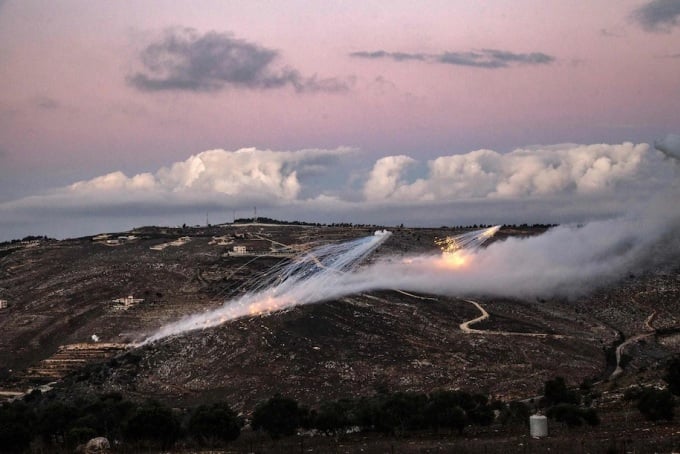
Israeli artillery shelled targets on the outskirts of Odaisseh, southern Lebanon on November 17. Photo: AFP
Israeli Foreign Minister Eli Cohen, during a visit to the area near the border on December 27, said Tel Aviv could target Hezbollah leader Hassan Nasrallah, a move that would almost certainly trigger a larger conflict with the armed group.
"We still try to prioritize a diplomatic solution. If it doesn't work, all other options are on the table," he said.
Experts say the risk of an escalation in the war between Israel and Hezbollah has increased significantly in recent days.
Peter Jennings, a senior fellow at the Australian Strategic Policy Institute, said the Israel-Lebanon border was becoming a "hotbed", with daily rocket attacks and retaliatory strikes from Israel.
"It hasn't escalated into a full-scale war, but I think it's still an extremely dangerous war zone," Jennings said.
He said Israel was considering whether it would have to launch a ground offensive to push Hezbollah back from the border. Hundreds of thousands of Israeli troops have been deployed to the north of the country and Tel Aviv sees Hezbollah as a potentially greater threat than Hamas.
"Hezbollah has more rockets, a larger fighting force and is located just north of Israel, where there are densely populated areas, making them a big threat," he said.
Hezbollah controls parts of the capital Beirut, all of southern Lebanon and much of the Beqaa Valley. Backed by Iran, it is one of the most heavily armed non-state military forces in the world.
Observers say Hamas has sought to call on Hezbollah and other armed groups in the Middle East to join forces against Israel, aiming to bring the Palestinian issue back to the center of Middle East discussion.
"What we know is that Hezbollah is gradually entering the war and becoming more and more daring. They have used almost all of their weapons against Israel, except long-range ones," said Jacques Neriah, a former top Israeli intelligence analyst who served as a foreign policy adviser to Prime Minister Yitzhak Rabin in the 1990s.
Israel recently evacuated about 70,000 people from residential areas on the country's northern border, after four civilians and nine soldiers were killed in raids. In Lebanon, more than 100 people have been killed and 120,000 have fled their homes to escape the bombardment.
A full-scale conflict between Israel and Lebanon would certainly have more serious consequences, according to observers.
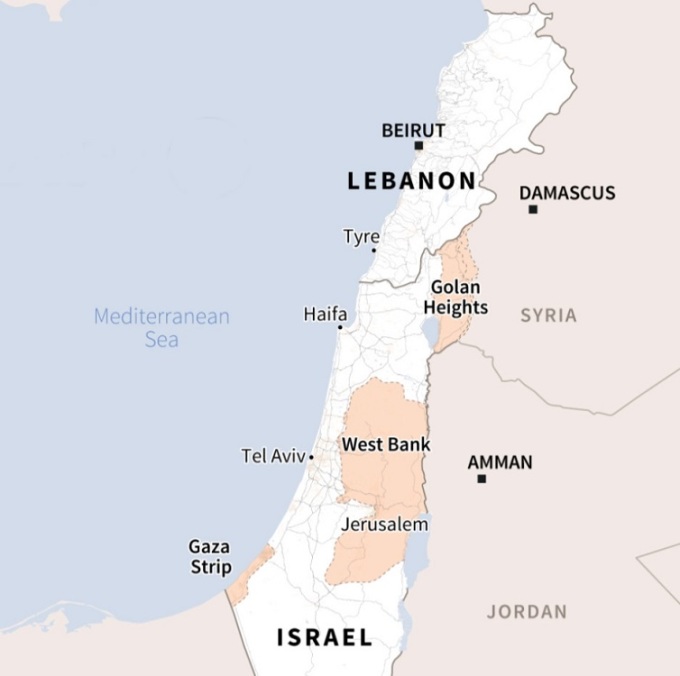
Location of Israel and Lebanon. Graphic: AFP
The administration of US President Joe Biden is said to be working to negotiate with Israel, Lebanon and intermediaries for Hezbollah to ease border tensions and restore long-term stability there, according to Lebanese officials.
The diplomatic effort is being led by Amos Hochstein, who oversaw negotiations last year that led to a historic agreement between Israel and Lebanon to resolve their maritime border dispute. Hezbollah backed the deal after initial objections.
The immediate focus of the talks is to prevent border fighting from escalating into full-scale conflict, according to people familiar with the matter. The Biden administration will also discuss the terms of a long-term agreement to restore stability along the border so that displaced people in northern Israel and southern Lebanon can return home.
Some members of the Lebanese government and military are also keen to push for talks, believing that a border deal would consolidate their power in Lebanon, where Hezbollah is also part of the leadership and has a dominant presence.
Hezbollah once enjoyed widespread support among the Lebanese people for its claim to reclaim lands it considered occupied by Israel. However, this has waned somewhat recently, with Hezbollah facing criticism for corruption, partisanship and using the pretext of reclaiming land to maintain its armed forces.
“Hezbollah is not going to do anything that would threaten its own survival or its deterrence capabilities and military position,” said Emile Hokayem, a senior fellow for Middle East security at the International Institute for Strategic Studies in Britain.
For those living in the border area, the biggest hope is for the fighting to end, security to be restored and for them to return home. "We just hope it will be months, not years," said Sigal Vishnetzer, a resident of the northern Israeli neighborhood of Manara.
Thanh Tam (According to Washington Post, The Australian, Al Jazeera )
Source link




![[Photo] Cutting hills to make way for people to travel on route 14E that suffered landslides](https://vphoto.vietnam.vn/thumb/1200x675/vietnam/resource/IMAGE/2025/11/08/1762599969318_ndo_br_thiet-ke-chua-co-ten-2025-11-08t154639923-png.webp)



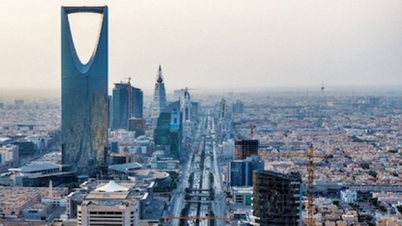




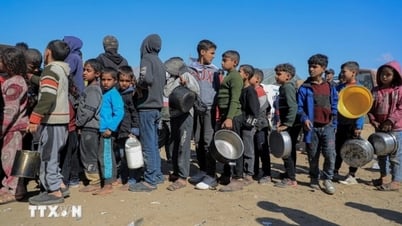
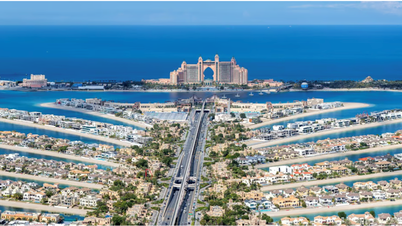





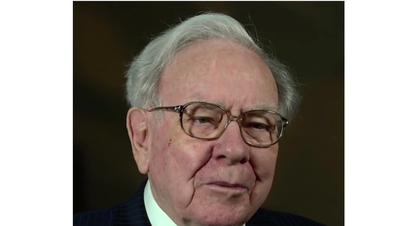



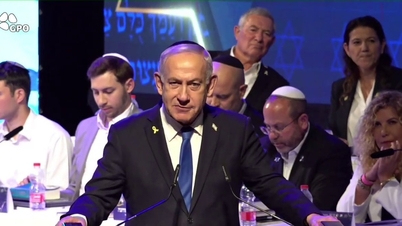
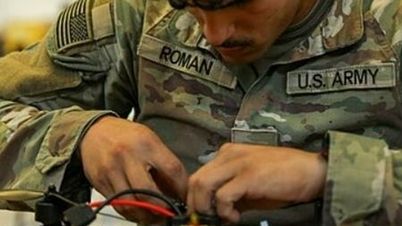



















![[Video] Hue Monuments reopen to welcome visitors](https://vphoto.vietnam.vn/thumb/402x226/vietnam/resource/IMAGE/2025/11/05/1762301089171_dung01-05-43-09still013-jpg.webp)




















































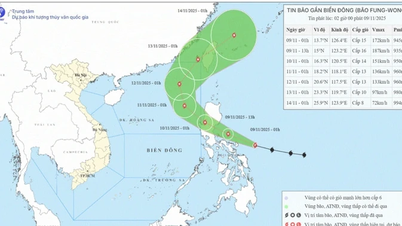



















Comment (0)